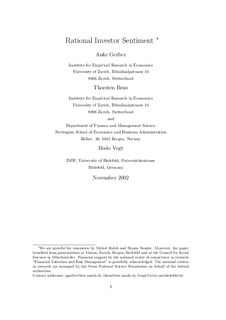| dc.contributor.author | Gerber, Anke | |
| dc.contributor.author | Hens, Thorsten | |
| dc.contributor.author | Vogt, Bodo | |
| dc.date.accessioned | 2006-07-13T08:49:17Z | |
| dc.date.available | 2006-07-13T08:49:17Z | |
| dc.date.issued | 2002-11 | |
| dc.identifier.issn | 1500-4066 | |
| dc.identifier.uri | http://hdl.handle.net/11250/163767 | |
| dc.description.abstract | We explain excess volatility, short-term momentum and long-term reversal of asset prices by a repeated game version of Keynes' beauty contest. In every period the players can either place a buy or sell order on the asset market. The actual price movement is determined by average market orders and noise. It is common knowledge that the noise process is an exogenous random walk. Our model explains short-term momentum and long-term reversal of stock prices by unpredictable switches in the co-ordination of the players. When the players are coordinated on buying (selling), we say the market is in the up (down) mood. In this model changing investor sentiment is a rational strategy as it leads to a Nash equilibrium of the coordination game. We give experimental evidence in support of our claims. | en |
| dc.format.extent | 2251339 bytes | |
| dc.format.mimetype | application/pdf | |
| dc.language.iso | eng | en |
| dc.publisher | Norwegian School of Economics and Business Administration. Department of Finance and Management Science | en |
| dc.relation.ispartofseries | Discussion paper | en |
| dc.relation.ispartofseries | 2003:8 | en |
| dc.subject | experimental asset markets | en |
| dc.subject | investor sentiment | en |
| dc.subject | behavioral finance | en |
| dc.title | Rational investor sentiment | en |
| dc.type | Working paper | en |
